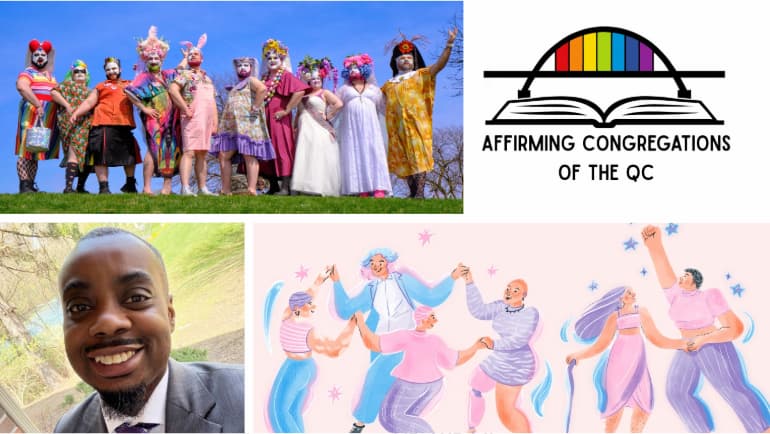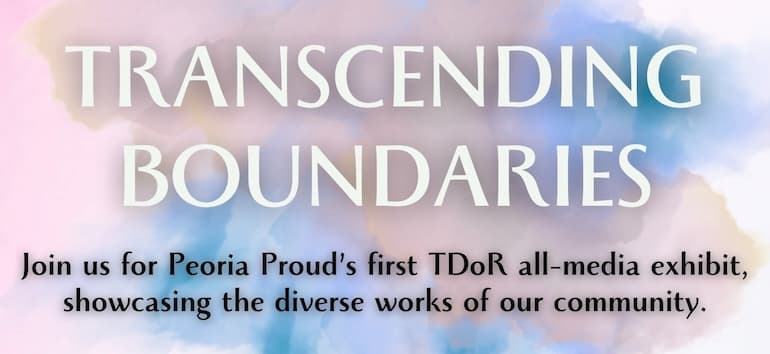As LGBTQ+ organizations throughout the country honor the Transgender Day of Remembrance this week with vigils, panels, receptions and more, some good news is emerging.
Violence against transgender people dropped significantly this year from last year worldwide and in the United States. In addition, Americans overall agree that acceptance of LGBTQ+ people – including transgender people – is greater today than 10 years ago.

The majority of Americans also agree that acceptance for LGBTQ+ people, including transgender people, is likely to increase in the coming 10 years.
This year, at least two dozen events are taking place in Illinois and Iowa to recognize the annual TDOR, started in 1999 by Bostonian Gwendolyn Ann Smith to honor her slain transgender friend Rita Hester, whose killing remains unsolved today.
Take a look below at event highlights, plus key people and groups featured; good news about safety and acceptance for transgender people; bad news including legislative trends and the enduring role of guns; and some additional diverse perspective on TDOR.
Highlights include online services, speakers, art reception
This year’s TDOR events have strong involvement by faith organizations. At least seven events involve faith groups, including vigils by the Affirming Congregations of the QC in Rock Island; Trinity Episcopal Church in Iowa City; Hope Church at The Bistro in Bloomington, Ill., and spiritual gatherings in Lincoln and Omaha, Neb.
In addition, both the nationwide Unitarian Universalists Association (UUA) and United Church of Christ (UCC) denominations are holding online services. UUA offers two online services tomorrow geared specifically toward transgender people, and UCC’s special event features openly transgender Rev. Dr. Lawrence T. Richardson.
Other special highlights this year include:
• The “Transcending Boundaries” artists’ reception and multi-media display in East Peoria, courtesy of Peoria Proud and Illinois Central College. If you can’t make it to the reception, the art will remain on display through Dec. 1.
• A vigil hosted by Des Moines’ new chapter of the Perpetual Sisters of Indulgence: the Priory of the Wilde Rose.
• An afternoon of transgender resources and organizations in Carbondale, Ill., at the Southern Illinois Transgender Resource Fair, courtesy of Rainbow Cafe and the Paulette Curkin Pride Center at Southern Illinois University.
• Three food-related TDOR events: a Thanksgiving meal in Olney Thursday, an all-day bake sale Thursday to benefit the Iowa Queer Student Alliance at Des Moines’ Drake University, and a “Transgiving” gathering in Carbondale Saturday.
Less murders, greater acceptance, increased optimism
Murders of transgender people dropped this year nationwide from 41 to 31; worldwide, that total dropped to 281 this year, down significantly from last year’s total of 350 murders, reports the Trans Murder Monitoring Project by Transgender Europe.
Acceptance of transgender and nonbinary people are also exceptionally high, reports GLAAD in its Accelerating Acceptance report. It notes that 87 percent of non-LGBTQ+ American agree transgender and nonbinary people deserve to live free of violence and discrimination. About 75 percent of non-LGBTQ+ adults say they’d support a family member or close friend if they came out as LGBTQ+.
In addition, Pew Research reports that 64 to 80 percent of LGBTQ+ adults believe acceptance is greater now than it was 10 years ago for lesbians, gays, bisexuals, transgender and nonbinary people – and that acceptance will be greater in the future for all categories. GLAAD also reports that in recent years, anti-LGBTQ incidents have dropped, as have anti-drag attacks.

More hate crimes reported, guns often involved, People of Color hit hardest
GLAAD also compiled some less encouraging news – including that half of all hate crimes against LGBTQ+ people take place against transgender and nonbinary people.
A proliferation of “anti-LGBQ+” legislation may be discouraging transgender people from openly reporting their experiences, some experts theorize. The Trump administration’s attempt to erase gender identity from public policy and law may also make it harder to track violence against transgender people.
Consistently, year after year, the vast majority of transgender people killed (78 to 88 percent) are People of Color. Also each year, from 44 to 68 percent of transgender murders involve guns. About one-third of those murdered are employed in the sex trade somehow, and about one-third to one-half of murders of transgender murders involve partners or friends.
About one-third of murders of transgender people each year happen in Brazil.
The annual TDOR tradition leaves some folks feeling like it places an undue focus on the suffering, rather than success, of transgender people. Black transgender activist Aaryn Lang, for instance, wrote in 2017 in Them magazine that she believes the event largely involves “predatory nonprofits” and “cisgender and privileged people” capitalizing off of transgender agony.
Others, like the GSA Network, believe the annual recognition can help educate people about transgender issues and “prevent anti-transgender further hatred and violence.”
To find events honoring the Transgender Day of Remembrance throughout Illinois, Iowa, Missouri and Nebraska, head to MainStream‘s TDOR Events 2025 calendar.
Cover photo features The Priory of the Wilde Rose Sisters of Perpetual Indulgence; the logo for the Affirming Congregations of the QC; artwork for the Southern Illinois Trans Resource Fair; and the Rev. Dr. Lawrence T. Richardson.

